人教版七年级上Unit 6Do you like bananas?Section B 2a-2c 课件(共23张PPT)
文档属性
| 名称 | 人教版七年级上Unit 6Do you like bananas?Section B 2a-2c 课件(共23张PPT) |  | |
| 格式 | ppt | ||
| 文件大小 | 3.8MB | ||
| 资源类型 | 教案 | ||
| 版本资源 | 人教新目标(Go for it)版 | ||
| 科目 | 英语 | ||
| 更新时间 | 2022-07-03 13:44:03 | ||
图片预览

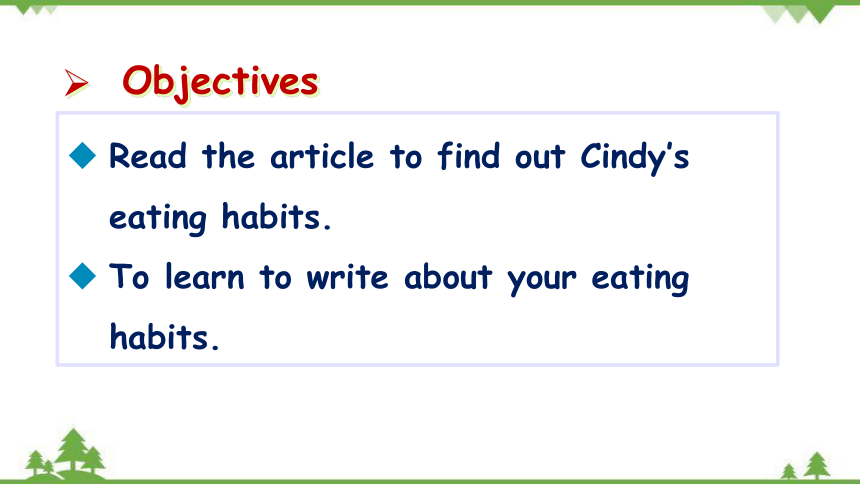
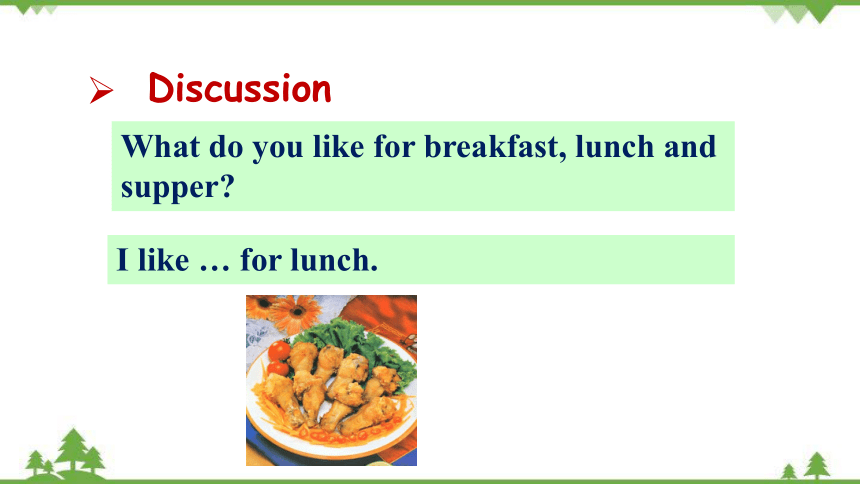
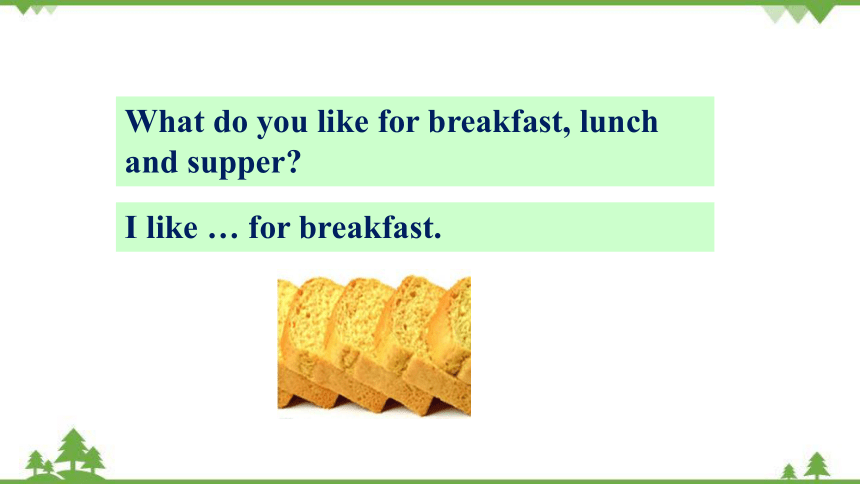
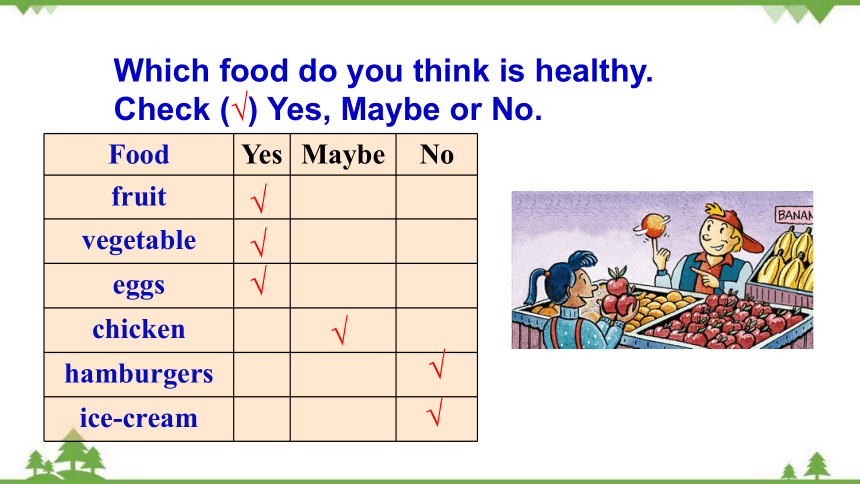
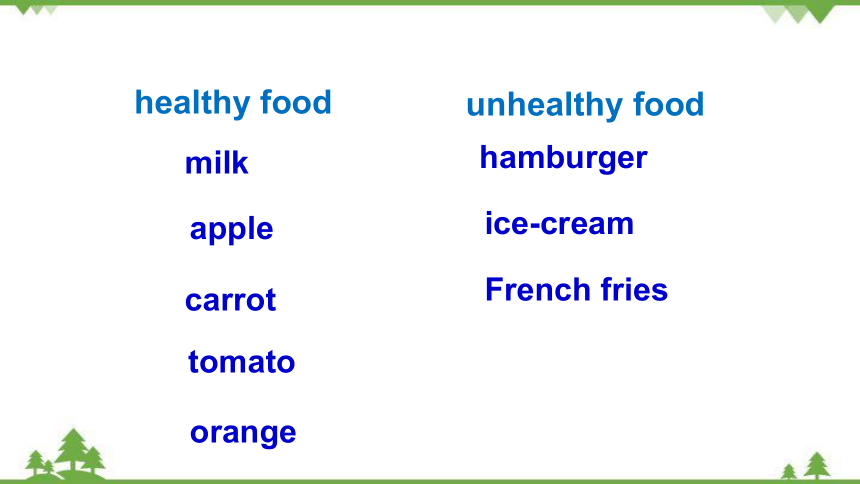
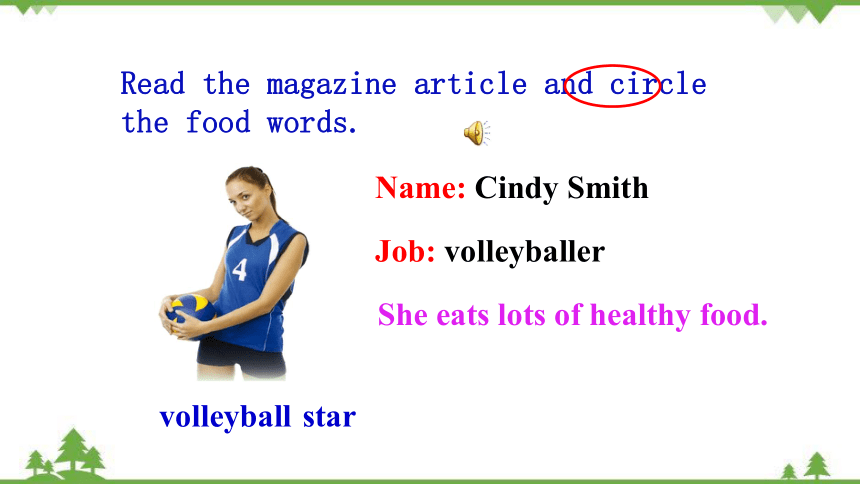
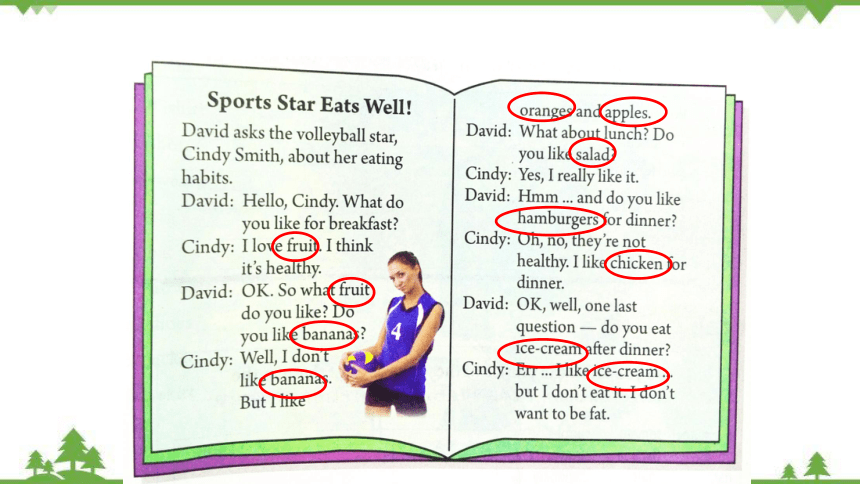
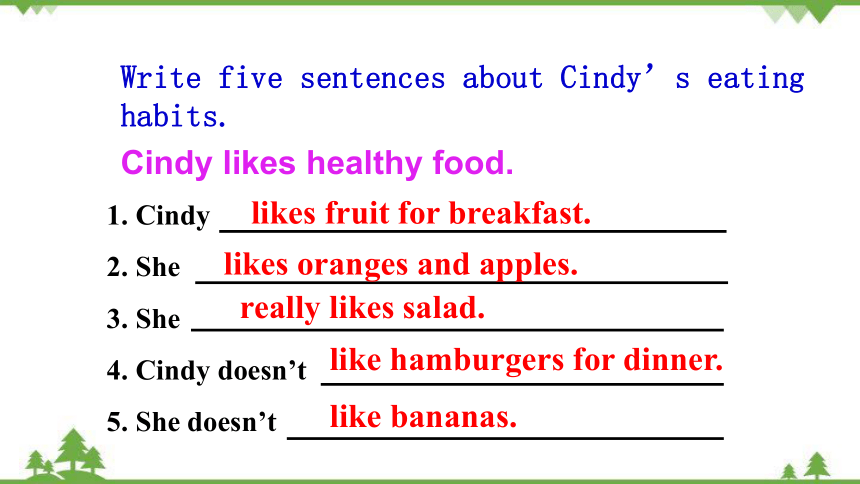
文档简介
(共23张PPT)
Unit 6
Do you like bananas
人教版七年级英语上册
Section B 2a-2c
Read the article to find out Cindy’s eating habits.
To learn to write about your eating habits.
Objectives
What do you like for breakfast, lunch and supper
I like … for lunch.
Discussion
What do you like for breakfast, lunch and supper
I like … for breakfast.
Food Yes Maybe No
fruit
vegetable
eggs
chicken
hamburgers
ice-cream
Which food do you think is healthy.
Check (√) Yes, Maybe or No.
√
√
√
√
√
√
2a
milk
apple
carrot
tomato
orange
hamburger
ice-cream
French fries
healthy food
unhealthy food
Job: volleyballer
Name: Cindy Smith
She eats lots of healthy food.
volleyball star
Read the magazine article and circle
the food words.
2b
Write five sentences about Cindy’s eating
habits.
Cindy likes healthy food.
1. Cindy
2. She
3. She
4. Cindy doesn’t
5. She doesn’t
likes oranges and apples.
really likes salad.
likes fruit for breakfast.
like hamburgers for dinner.
like bananas.
2c
Language points
1. some和many 的区别
(1) some 意思是 “一些”, 可以修饰可数名词, 也可以
修饰不可数名词。
e.g. some friends 一些朋友 some water 一些水
(2) many 修饰可数名词, 意思是 “许多”。不可数名词要用
much修饰。
e.g. many bananas 许多香蕉 much milk 许多牛奶
2. volleyball 排球
volleyballer 排球运动员
后缀-er一般用来表示人。
e.g. work (工作) --- worker(工人)
sing(唱歌) --- singer(歌手)
teach (教) --- teacher(教师)
run (跑) ---runner(跑步的人)
3. I like chicken for dinner. 晚餐我喜欢吃鸡肉。
for dinner在句中作状语。
2) have /has也可以表示 “吃”或 “喝”。
英语中人们习惯用have来表示吃早、中、晚饭。
而不用eat来表示, 且三餐前不加定冠词the。
e.g. Let’s have lunch. 我们吃午饭吧。
Let’s have some salad.
让我们吃些沙拉吧。
4. I don’t want to be fat. 我不想变胖。
want的用法:
want sth. 想要某物
want to do sth. 想要做某事
want sb. to do sth. 想要某人做某事
e.g. I want some water.
I want to eat an apple.
He wants his mother to have a rest.
do 表示
动词原形
Summary
1. He likes eggs and bananas ___ dinner.
2. Her _______ habit is not good.
3. In the red bag, I saw five ________.
4. Mike ____ three pencils and two pens.
5. Anna doesn’t want _______ fat.
for, be, eat, have, tomato
I. 从方框中选择单词,并用其正确形式填空。
for
eating
tomatoes
has
to be
Exercises
1. 我喜欢橙子和梨,你呢?
I like oranges and pears. _____ _____ you
2. 你晚饭吃什么?
What do you have ___ ______
3. 我们有相同的饮食习惯。
We have the same ______ _____.
4. 胡萝卜是健康食品。
Carrots are _______ _____.
5. 你妈妈喜欢什么水果?
______ _____ does your mother like
What about
for dinner
eating habit
healthy food
What fruit
II. 根据汉语提示完成句子,每空一词。
III. 根据提示词完成对话。
1. A: __________________________
(Mrs. Green, oranges)
B: Yes, she does.
2. A: __________________________!
(let’s, strawberries)
B: Sounds good.
Does Mrs. Green like oranges
Let’s have some strawberries
3. A: _______________________ (for lunch)
B: I like chicken and rice.
4. A: Do your parents like fruit salad
B: ___________. (yes)
5. A: Does your brother like ice-cream
B: _____________. (no)
What do you like for lunch
No, he doesn’t
Yes, they do
IV. 将下列句子按照正确的顺序,排列组成一段通顺
的对话。
A. What about dinner
B. Do you have breakfast every day
C. I usually have some fruit like apples and
bananas. They are healthy food.
D. Oh, what do you have for lunch
E. Yes, I do. I eat hamburgers and milk.
F. Yes, you are right.
G. For lunch, I eat chicken and rice. They are
delicious (美味的).
1
2
3
4
5
6
7
V. 汉译英。
1. 她晚餐吃鸡肉、西红柿、炸薯条,还
有甜点冰淇淋。
For dinner, she has chicken, tomatoes, French fries, and for dessert, ice cream.
2. 汤姆吃很多健康食物,早餐他喜欢吃
鸡蛋,桔子还有香蕉。
Tom eats lots of healthy food. For breakfast, he likes to have eggs, oranges and bananas.
Homework
Make a survey of healthy food and
unhealthy food.
Healthy (健康的) Unhealthy (不健康的)
Unit 6
Do you like bananas
人教版七年级英语上册
Section B 2a-2c
Read the article to find out Cindy’s eating habits.
To learn to write about your eating habits.
Objectives
What do you like for breakfast, lunch and supper
I like … for lunch.
Discussion
What do you like for breakfast, lunch and supper
I like … for breakfast.
Food Yes Maybe No
fruit
vegetable
eggs
chicken
hamburgers
ice-cream
Which food do you think is healthy.
Check (√) Yes, Maybe or No.
√
√
√
√
√
√
2a
milk
apple
carrot
tomato
orange
hamburger
ice-cream
French fries
healthy food
unhealthy food
Job: volleyballer
Name: Cindy Smith
She eats lots of healthy food.
volleyball star
Read the magazine article and circle
the food words.
2b
Write five sentences about Cindy’s eating
habits.
Cindy likes healthy food.
1. Cindy
2. She
3. She
4. Cindy doesn’t
5. She doesn’t
likes oranges and apples.
really likes salad.
likes fruit for breakfast.
like hamburgers for dinner.
like bananas.
2c
Language points
1. some和many 的区别
(1) some 意思是 “一些”, 可以修饰可数名词, 也可以
修饰不可数名词。
e.g. some friends 一些朋友 some water 一些水
(2) many 修饰可数名词, 意思是 “许多”。不可数名词要用
much修饰。
e.g. many bananas 许多香蕉 much milk 许多牛奶
2. volleyball 排球
volleyballer 排球运动员
后缀-er一般用来表示人。
e.g. work (工作) --- worker(工人)
sing(唱歌) --- singer(歌手)
teach (教) --- teacher(教师)
run (跑) ---runner(跑步的人)
3. I like chicken for dinner. 晚餐我喜欢吃鸡肉。
for dinner在句中作状语。
2) have /has也可以表示 “吃”或 “喝”。
英语中人们习惯用have来表示吃早、中、晚饭。
而不用eat来表示, 且三餐前不加定冠词the。
e.g. Let’s have lunch. 我们吃午饭吧。
Let’s have some salad.
让我们吃些沙拉吧。
4. I don’t want to be fat. 我不想变胖。
want的用法:
want sth. 想要某物
want to do sth. 想要做某事
want sb. to do sth. 想要某人做某事
e.g. I want some water.
I want to eat an apple.
He wants his mother to have a rest.
do 表示
动词原形
Summary
1. He likes eggs and bananas ___ dinner.
2. Her _______ habit is not good.
3. In the red bag, I saw five ________.
4. Mike ____ three pencils and two pens.
5. Anna doesn’t want _______ fat.
for, be, eat, have, tomato
I. 从方框中选择单词,并用其正确形式填空。
for
eating
tomatoes
has
to be
Exercises
1. 我喜欢橙子和梨,你呢?
I like oranges and pears. _____ _____ you
2. 你晚饭吃什么?
What do you have ___ ______
3. 我们有相同的饮食习惯。
We have the same ______ _____.
4. 胡萝卜是健康食品。
Carrots are _______ _____.
5. 你妈妈喜欢什么水果?
______ _____ does your mother like
What about
for dinner
eating habit
healthy food
What fruit
II. 根据汉语提示完成句子,每空一词。
III. 根据提示词完成对话。
1. A: __________________________
(Mrs. Green, oranges)
B: Yes, she does.
2. A: __________________________!
(let’s, strawberries)
B: Sounds good.
Does Mrs. Green like oranges
Let’s have some strawberries
3. A: _______________________ (for lunch)
B: I like chicken and rice.
4. A: Do your parents like fruit salad
B: ___________. (yes)
5. A: Does your brother like ice-cream
B: _____________. (no)
What do you like for lunch
No, he doesn’t
Yes, they do
IV. 将下列句子按照正确的顺序,排列组成一段通顺
的对话。
A. What about dinner
B. Do you have breakfast every day
C. I usually have some fruit like apples and
bananas. They are healthy food.
D. Oh, what do you have for lunch
E. Yes, I do. I eat hamburgers and milk.
F. Yes, you are right.
G. For lunch, I eat chicken and rice. They are
delicious (美味的).
1
2
3
4
5
6
7
V. 汉译英。
1. 她晚餐吃鸡肉、西红柿、炸薯条,还
有甜点冰淇淋。
For dinner, she has chicken, tomatoes, French fries, and for dessert, ice cream.
2. 汤姆吃很多健康食物,早餐他喜欢吃
鸡蛋,桔子还有香蕉。
Tom eats lots of healthy food. For breakfast, he likes to have eggs, oranges and bananas.
Homework
Make a survey of healthy food and
unhealthy food.
Healthy (健康的) Unhealthy (不健康的)
同课章节目录
- starters 预备篇(2012秋审查)
- Unit 1 Good morning !
- Unit 2 What’s this in English?
- Unit 3 What color is it ?
- Unit 1 My name's Gina.
- Section A
- Section B
- Unit 2 This is my sister.
- Section A
- Section B
- Unit 3 Is this your pencil?
- Section A
- Section B
- Unit 4 Where's my schoolbag?
- Section A
- Section B
- Unit 5 Do you have a soccer ball?
- Section A
- Section B
- Unit 6 Do you like bananas?
- Section A
- Section B
- Unit 7 How much are these socks?
- Section A
- Section B
- Unit 8 When is your birthday?
- Section A
- Section B
- Unit 9 My favorite subject is science.
- Section A
- Section B
